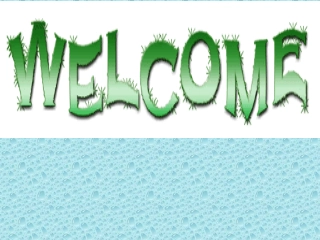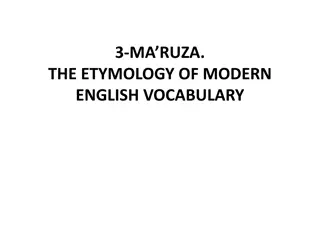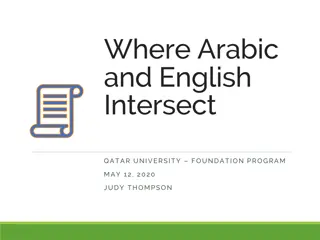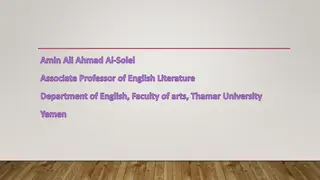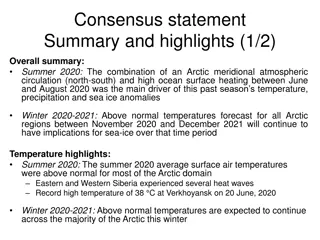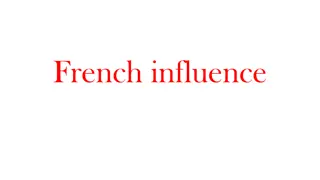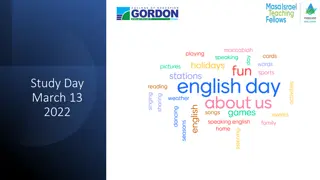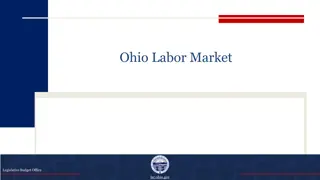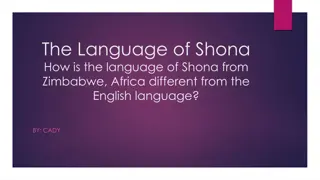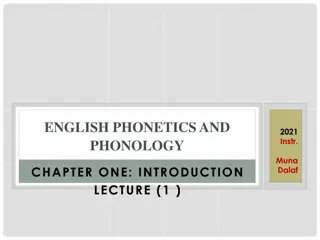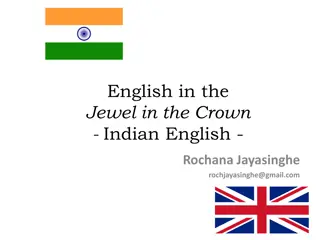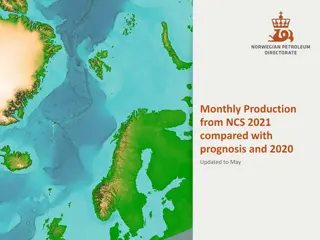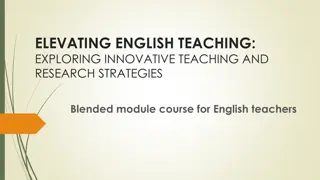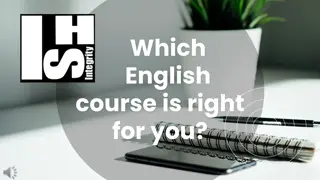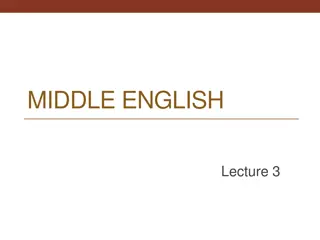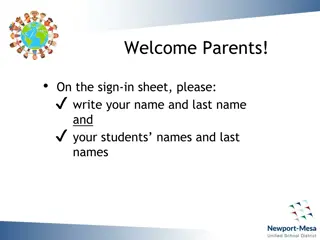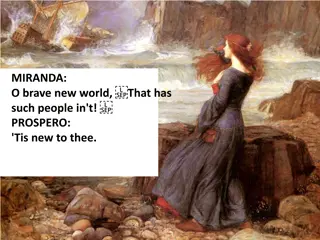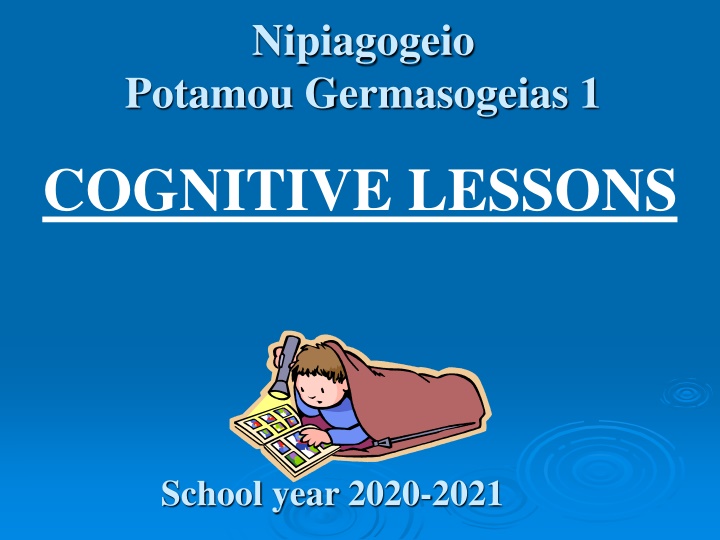
Cognitive Lessons for Full Development in Early Education
Explore cognitive lessons in mathematics, language education, and natural sciences for the 2020-2021 school year at Nipiagogeio Potamou Germasogeias. Topics include mathematical thinking, language development, spatiotemporal concepts, and communication skills in kindergarten. Enhance children's abilities in problem-solving, verbal and non-verbal communication, and scientific understanding.
Download Presentation

Please find below an Image/Link to download the presentation.
The content on the website is provided AS IS for your information and personal use only. It may not be sold, licensed, or shared on other websites without obtaining consent from the author. If you encounter any issues during the download, it is possible that the publisher has removed the file from their server.
You are allowed to download the files provided on this website for personal or commercial use, subject to the condition that they are used lawfully. All files are the property of their respective owners.
The content on the website is provided AS IS for your information and personal use only. It may not be sold, licensed, or shared on other websites without obtaining consent from the author.
E N D
Presentation Transcript
Nipiagogeio Potamou Germasogeias 1 COGNITIVE LESSONS School year 2020-2021
The purpose of mathematics in kindergarten is to develop mathematical thinking and problem solving support for general all-round development of the child.
Spatiotemporal concepts (up-down, inside/out, back/front, left/right) Understanding concepts as a whole, more / less / equal Groupings Altitude concept of numbers (numerical symbols distinction, cardinality, writing) Correspondence patterns Geometrical shapes Construction and interpretation of graphs
The aim of language education is to provide appropriate experience within the interests and abilities of children to develop communication skills (verbal and otherwise), speech skills (oral and written) and foster positive attitudes to language contact and literature.
The development of language and the ability to communicate primarily enhanced from contacts with others. Hearing-Listening Oral expression (speech) Emergent Literacy-Writing Emergent Literacy-Read understanding
clipart kid talking Language skills clipart kid talking Children should: Take part in conversations as listener- speaker Express feelings, opinions and decisions, to explain and argue about their choices Enrich their vocabulary Make right structured sentences Tell a story by seeing the pictures Recognize the "voices-sounds" of the letters To describe objects and events
PURPOSES To observe the immediate environment objects and phenomena using as many senses as possible. To distinguish similarities and differences. To submit questions and puzzles. To formulate recommendations. (What would happen if ...)
PURPOSES To make predictions. To participate in experiments actively. To be able to come to simple conclusions. To understand and interpret the events of daily life based on simple scientific experiences.
Purposes Acquiring environmental awareness Getting the related knowledge, to understand the seriousness of environmental issues and to have critical thinking To discover the environment To implement recycling and composting actions e.t.c.
The Art Education is designed to give children the experience and skills to create and observe various visual forms, to cultivate a positive attitude to artistic expression and raise awareness on issues related to Environment, Art and Culture.
PURPOSES To enjoy music. To learn to sing properly. To understand the basic concepts of music. (slow-fast, loud-soft) To know the different musical instruments.
PURPOSES To understand the importance of exercise in our lives. To develop basic motor skills and ability to coordinate movements. To develop endurance, flexibility, agility. To use movement to express themselves freely and creatively using music, rhythm, dance, drama.
Myself The organs and functions of the body, Senses Sensors, The two sexes
My self and others Personal development Self-awareness Socially acceptable behavior interpersonal relationships Family, relatives, friends, social events.
Nutrition and health Origin and nutritional value of foods. Use and abuse of substances, I protect my health, Healthy living habits
Socialization Development of skills of good work and cooperation Growing environmental awareness
Acceptance of diversity of people Resolution of disputes and conflict with dialogue.
Respect feelings and rights of other children. Respect people different color, language and race
Full development Cognitive objects Social Studies
Improvement of social skills clipart kids talking Verbal communication Active listening Conflict Resolution Cooperation, taking Relation Relation ships ships decision Empathy Acceptance, Friendship.
All children to acquire, Communication skills in order to adapt and integrate them in the school. (Child Socialization, personality traits. Personal Security. Emotional stability)
Goals Familiarity in the use of concepts of time (before, after, later, today) Place events in time in a variety of ways of periods (one day, one week, one month) Comparison of fixed and changed data The age as a data that differentiate in time, objects and persons
Goals Use of space-time concepts (in, out, up, down, in front, back, between) Evaluation of the use of the place of the kindergarten Use of weather concepts with appropriate vocabulary Connection of the weather with human activities Improvement of the skills geographical investigator with outdoor study
Full development Cognitive lessons Religious and Moral Education
PURPOSES To realize their religious identity and how it is connected to their daily life, tradition and history of the country To get in touch with the religious cultural practices of the country and the tradition To appreciate and cultivate the Christian values of love, peace, friendship, coexistence, equality, respect for diversity in a way that motivates altruistic action
PURPOSES To know the different parts of the computer and its use. To acquire basic computer skills. To know and use modern learning technologies. To realize the importance of using a computer and potential drawbacks.

